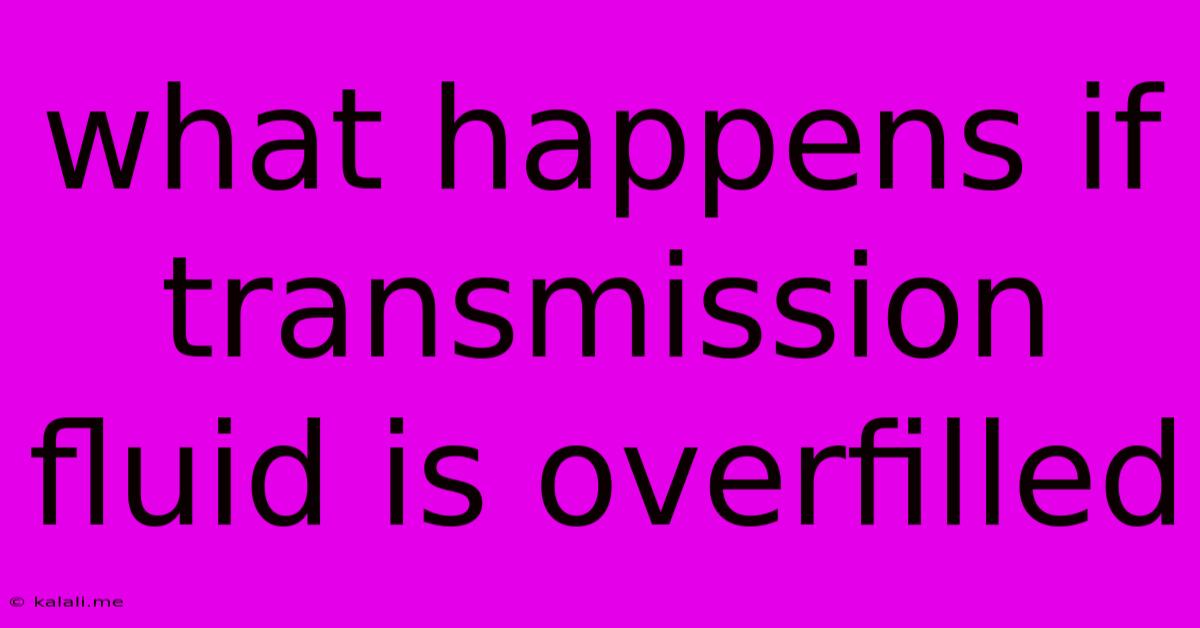What Happens If Transmission Fluid Is Overfilled
Kalali
May 31, 2025 · 3 min read

Table of Contents
What Happens if Transmission Fluid is Overfilled? The Risks of Too Much ATF
Overfilling your transmission fluid might seem like a minor issue, but it can lead to significant problems for your vehicle's transmission. This article delves into the potential consequences of overfilling automatic transmission fluid (ATF) and explains why maintaining the correct fluid level is crucial for optimal transmission performance and longevity. Ignoring this seemingly small detail can lead to costly repairs down the line.
Understanding Your Transmission and ATF
Your transmission is a complex system responsible for transferring power from the engine to the wheels. Automatic transmission fluid (ATF) acts as the lifeblood of this system, lubricating moving parts, facilitating smooth gear shifts, and helping to regulate temperature. The correct ATF level is critical for its proper functioning. Too little fluid and you risk damage from friction and overheating; too much, and you risk a cascade of problems.
Consequences of Overfilling Transmission Fluid
Overfilling your transmission with ATF can cause a range of issues, some immediate and some that develop over time. Here are some of the key problems:
-
Foam Formation: Excess fluid can create excessive churning within the transmission, leading to the aeration of the ATF. This creates foam, which compromises the fluid's lubricating properties and can damage internal components. The foam can also interfere with the transmission's hydraulic system, causing erratic shifting and potential damage to the valve body.
-
Seals and Gaskets: Overpressure from excessive fluid can cause seals and gaskets within the transmission to leak or fail prematurely. This can lead to fluid loss, further exacerbating the problem and potentially causing more significant damage. ATF leaks are messy and costly to repair.
-
Increased Internal Pressure: The extra fluid increases the pressure inside the transmission case, potentially stressing various internal components. This can lead to premature wear and tear on gears, clutches, and other critical parts. This increased pressure can also affect the performance of the transmission's pressure control system.
-
Poor Shifting and Performance: Foaming and increased pressure can lead to sluggish shifting, slipping gears, and general poor transmission performance. You might experience harsh shifts, delayed engagement, or even complete transmission failure.
-
Overheating: Although counterintuitive, an overfilled transmission can still overheat. The excessive fluid can hinder proper heat dissipation, leading to damage from excessive temperatures.
-
Damage to Torque Converter: The torque converter is a crucial component of the automatic transmission. Excessive fluid can overload the converter, leading to its premature wear and potential failure.
How to Avoid Overfilling Transmission Fluid
The best way to avoid overfilling is to follow the manufacturer's recommendations. Consult your vehicle's owner's manual for the correct fluid type and the proper checking procedure. Use the dipstick provided (if equipped), ensuring that the fluid is checked at the correct operating temperature (often after a short drive). Never overfill – it's better to be slightly under than over.
If you are unsure about checking or changing your transmission fluid, it's always best to consult a qualified mechanic. They possess the expertise and tools to perform this service correctly, ensuring the longevity of your vehicle's transmission.
In Conclusion:
Maintaining the correct transmission fluid level is critical for the health and performance of your vehicle. Overfilling can lead to a cascade of problems, from poor shifting to complete transmission failure. Remember to always consult your owner's manual and seek professional help if you're unsure about checking or changing your transmission fluid. Preventing overfilling is far cheaper and less stressful than dealing with costly repairs later.
Latest Posts
Latest Posts
-
Sum Of Two Uniform Random Variables
Jun 01, 2025
-
What Does U Stand For On A Circuti Board
Jun 01, 2025
-
How To Say Mommy In Japanese
Jun 01, 2025
-
Square Root Of 3 Is Irrational
Jun 01, 2025
-
Can We Make It Illegal To Store Data Digitallu
Jun 01, 2025
Related Post
Thank you for visiting our website which covers about What Happens If Transmission Fluid Is Overfilled . We hope the information provided has been useful to you. Feel free to contact us if you have any questions or need further assistance. See you next time and don't miss to bookmark.